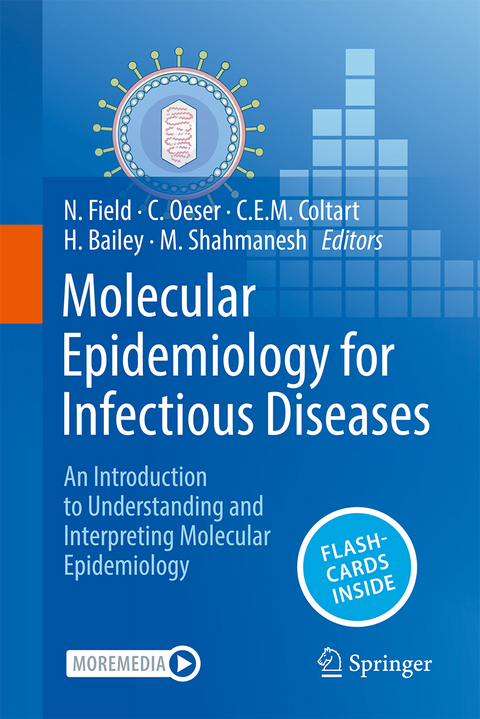
Molecular Epidemiology for Infectious Diseases
Springer International Publishing (Verlag)
978-3-031-76447-9 (ISBN)
- Noch nicht erschienen - erscheint am 24.03.2025
- Versandkostenfrei innerhalb Deutschlands
- Auch auf Rechnung
- Verfügbarkeit in der Filiale vor Ort prüfen
- Artikel merken
This textbook introduces the reader to molecular epidemiology as a field that improves our understanding of infectious diseases, their natural history, and their control. The sudden onset of the COVID-19 pandemic prompted an increased awareness about epidemiology and molecular biology. Policy makers have required specialist knowledge to assess the evolving situation and make informed judgements about the clinical and public health implications.
This book bridges the gap between primary research and advanced graduate textbooks.
The field of molecular epidemiology has developed at the interface between epidemiology and molecular biology as high throughput molecular techniques have become cheaper and increasingly sophisticated for typing pathogen strains and characterising the host immune response. At the same time, bioinformatics and statistical methods have evolved so these complex and high-dimensional data can be analysed in combination with classical epidemiological data on time, person, and place. However, the analysis of datasets combining classical epidemiological and molecular data is highly specialised. Few postgraduate courses cover this topic in sufficient detail to allow meaningful interpretation.
This textbook introduces the major methods used to generate molecular datasets and the epidemiological and statistical concepts that are used to link these data with clinical and behavioural data. An introductory chapter explains key terms, definitions and the challenges of accurate and reproducible measurements in microbiology (metrology) and reviews the development of molecular epidemiology as a field and its history. Subsequent chapters introduce the readers to pathogen phylogenetics, host transcriptomics, proteomics, serology, and the microbiome. An additional chapter covers the ethical issues that arise when using molecular data combined with epidemiological and clinical information. The concluding chapter takes a look at the bigger picture and considers the contributions of molecular epidemiology to infectious disease control and health policy.
Additional questions and answers via app: Download the Springer Nature Flashcards app free of charge and use exclusive additional material to test your knowledge.
Nigel Field is Professor of Infectious Diseases Epidemiology, Director of the UCL Centre of Molecular Epidemiology and Translational Research at the Institute for Global Health (IGH), Co-Director of the MSc Applied Infectious Diseases Epidemiology AIDE, Author of STROME-ID and of STROBE-Metagenomics on molecular epidemiology. He is an infectious disease epidemiologist specialising in large-scale studies using molecular epidemiology to gain insights about acquisition and transmission of gut microbiota and a range of pathogens.
Clarissa Oeser is an Infectious Diseases Epidemiologist with a background in paediatric infectious diseases and molecular diagnostics. She is co-lead of the Molecular Epidemiology for Infectious Diseases MSc AIDE module at UCL and co-author of STROBE-Metagenomics. Her research interest is in early life exposures and their effect on infectious outcomes in childhood.
Cordelia E. M. Coltart is Consultant Clinical Academic in Infectious Diseases in the Division of Infection and Immunity at UCL and the Royal Free Hosptial NHS trust, dividing her time between clinical work and academia. Her research investigates the utility of pathogen genomics for public health benefit - focussing on integrating pathogen genomics with epidemiology to inform the early detection, management and control of infectious diseases, both at a patient and population level. She developed and co-led the Molecular Epidemiology for Infectious Diseases MSc module at UCL.
Heather Bailey is an Associate Professor in Infectious Disease Epidemiology at the Institute for Global Health, University College London. Her research interests lie in the impact of infections on maternal and child health, including vertical transmission, its consequences, and prevention.
Maryam Shahmanesh is Professor of Global Health at IGH, UCL, Consultant Physician in HIV at the Mortimer Market Centre, and Faculty Lead for clinical research at the Africa Health Research Institute in KwaZulu-Natal, South Africa. She brings expertise in working in the interdisciplinary space between social science, clinical research, and epidemiology. She has developed two interdisciplinary MSc courses at UCL, in Population Health, and in Applied Infectious Disease Epidemiology.
Foreword.- Preface.- Underlying Principles and Key Methods for Infectious Disease Molecular Epidemiology.- Critical Appraisal of Molecular Epidemiology Infectious Disease Research.- Phylogenetics for Genomic Epidemiolog.- The Microbiome in Epidemiological Research.- Host Transcriptomics for Infectious Diseases.- Sero-Epidemiology: The Use of Population-based Antibody Measures to Inform Disease Dynamics.- The Ethics of Molecular Epidemiology for Infectious Disease.- Public Health Applications of Infectious Disease Molecular Epidemiology - So What.
| Erscheint lt. Verlag | 24.3.2025 |
|---|---|
| Zusatzinfo | XIV, 214 p. 29 illus., 26 illus. in color. |
| Verlagsort | Cham |
| Sprache | englisch |
| Maße | 155 x 235 mm |
| Themenwelt | Studium ► Querschnittsbereiche ► Epidemiologie / Med. Biometrie |
| Studium ► Querschnittsbereiche ► Infektiologie / Immunologie | |
| Naturwissenschaften ► Biologie ► Genetik / Molekularbiologie | |
| Schlagworte | clinical and behavioural data • computational methods • host transcriptomics • Infectious Diseases • Metrology • microbiome • molecular datasets • Molecular Epidemiology • molecular typing methods • pathogen pylogenetics • Serology • Statistical Concepts |
| ISBN-10 | 3-031-76447-1 / 3031764471 |
| ISBN-13 | 978-3-031-76447-9 / 9783031764479 |
| Zustand | Neuware |
| Informationen gemäß Produktsicherheitsverordnung (GPSR) | |
| Haben Sie eine Frage zum Produkt? |
aus dem Bereich


